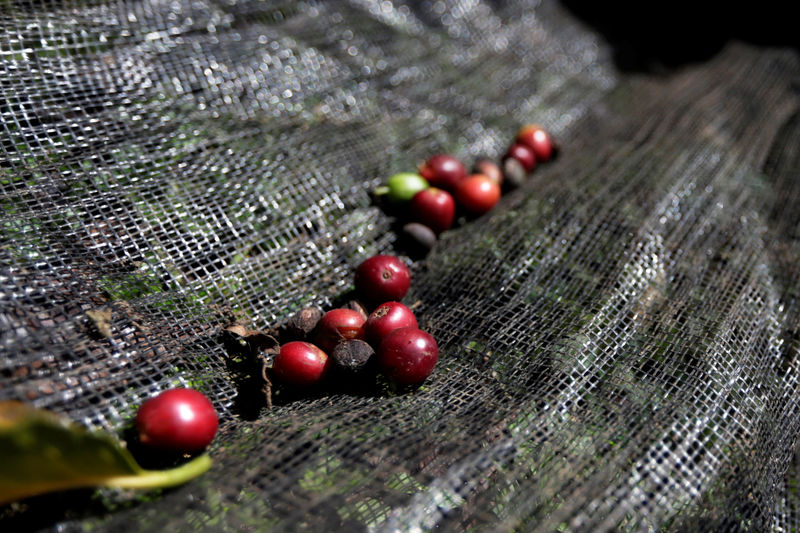By Julia Symmes Cobb
CHINCHINA, Colombia (Reuters) - Third generation Colombian coffee farmer Mauricio Giraldo knows all too well the stress of seeing some of his crop rot on the tree because he cannot find enough workers to pick the cherry-like red fruit.
His 35-hectare (86-acre) farm in the southern mountains of Huila requires 80 pickers, but sometimes during busy harvest seasons he can find only half that, as people gravitate towards urban centres and away from arduous agricultural work.
Colombia, the world's top producer of washed arabica coffee, lacks between 60,000 and 90,000 pickers overall, but a new machine invented by the coffee growers' federation and Brazilian machinery company Brudden could cut that shortage in half.
The DSC-18, similar in dimensions and noise to a home weed-whacker, was built specifically for the steep slopes of Colombian coffee country, unlike the huge harvesting combines used in Brazil's flatter coffee terrain.
At one end of the machine are two vibrating silver tongs - strong enough to knock ripe coffee berries off a branch, light enough not to disturb still-green fruit that has yet to mature.
"It's a great tool," Giraldo, 37, said while attending the debut demonstration of the machine with 300 other coffee growers in central Caldas province. "It's an opportunity to reduce production costs and not lose coffee in high season when we can't find workers."
The machine will play a major role in alleviating the country's perennial labour shortage, which is often exacerbated by a rolling harvest that requires workers to move from province to province, said federation head Roberto Velez.
"Labour is more scarce all the time," Velez said as several DSC-18s whirred behind him on the federation's test farm near Chinchina.
He estimates the DSC-18 could eventually save farmers 20 percent in costs, as they hire fewer workers and the average worker doubles daily output to about 176 kilos. Workers' salaries are also predicted to rise, since they are paid based on how much they harvest.
More than half a million Colombian families make a living from coffee-farming. They hire more than 400,000 harvest workers in a typical year, according to federation figures.
The machines will retail for about $530 and the first batch will be in farmers' hands by March, said Brudden's commercial director Evair Rojo.
"In two years of development we made a machine that's more selective - it can touch the branch, move the red berries and keep the green ones in place," he said.
Rojo expects his company to get up to 6,000 initial orders. Farmers in Central American and African countries will also be able to place orders.
Brazil's coffee harvest has long been mechanized, with large combines stripping trees in huge flat fields.
Colombia and other mountainous coffee-growing countries like Guatemala and Costa Rica have struggled to mechanize because of steep terrain and the rolling harvest which rules out machines that strip branches of all berries at once.
For Johanna Romero, 40, who farms in Cundinamarca province, the machine's potential is worth changing how her farm is run.

"All change causes trauma, but we need to take a risk and adopt new technologies."